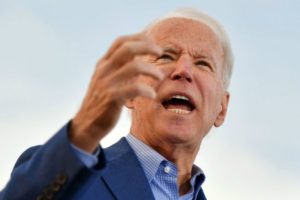
Democratic presidential candidate Joe Biden at a campaign rally in Kansas City on March 7, 2020. (Mandel Ngan/AFP/Getty)
WASHINGTON — Joe Biden’s website now includes “Joe Biden’s Agenda for the Jewish Community.”
On Iran, Biden told the Council on Foreign Relations a year ago, Trump has “no viable plan.” On North Korea, Biden said, “diplomacy requires a strategy, a process, and competent leadership to deliver.” On Afghanistan, “President Trump has systematically undercut his negotiators.” And so on.
So how coherent is Biden’s Middle East policy? Personal relationships are key to the former vice president, and one can map out a policy by pinning it to his relationships with three people: Golda Meir, Menachem Begin and Barack Obama.
Golda Meir
It is the timing of his 1973 encounter with Golda Meir, the former Israeli leader, that underscores how seminal the visit was in shaping his views. The 30-year-old freshman senator was spooked by Israel’s vulnerability.
“I remember driving from Cairo all the way out to the Suez,” Biden told an Israel Independence Day celebration in Washington in 2015, referring to the Egyptian leg of that trip.
“And you could see these great plumes of dust and sand. But none [of] it seemed isolated. It turns out it was maneuvers taking place in the desert. And I was really worried. And we went through, and [Golda Meir] painted a bleak, bleak picture — scared the hell out of me, quite frankly, about the odds.”
He departs from the left’s calls to leverage aid to Israel to pressure it to make concessions. He said last November after the J Street conference that it would be a “gigantic mistake” and “absolutely outrageous” to leverage aid.
Menachem Begin
In a closed 1982 meeting that then-Israeli Prime Minister Menachem Begin had with Democratic senators, Biden and Begin yelled at each other. Begin said Israel would abjure US aid rather than give in to US demands.
Biden in the meeting had raised Israel’s settlement expansion and other senators were critical of Israel’s invasion of Lebanon.
Biden says he was telling Begin what was likely to happen — there would be pressure to cut aid to Israel — not that he would recommend it.
“Israel could get into a fistfight with this country, and we’d still defend you,” Biden told Michael Oren in 2010, then the Israeli ambassador to the US, when the US-Israel was at a low point over settlement expansion, according to Oren’s autobiography, Ally.
Last week, Biden said, “A priority now for the cause of Israeli-Palestinian peace should be resuming our dialogue with the Palestinians and pressing Israel not to take actions that make a two-state solution impossible..”
“I will reopen the US consulate in East Jerusalem, find a way to reopen the PLO’s diplomatic mission in Washington, and resume the decades-long economic and security assistance efforts to the Palestinians that the Trump Administration stopped.”
Biden will restore aid to the Palestinians, re-recognize the claim they have to Jerusalem and engage with them through diplomatic channels. He will not reverse Trump’s decision to move the embassy to Jeru-salem.
Barack Obama
A lot of Biden sentences begin with “my friend Barack,” and his closeness to Obama extends to his pledge to revive Obama’s Middle East policies, particularly as they relate to the Iran nuclear deal.
“President Trump abandoned the Joint Comprehensive Plan of Action (JCPOA) — a deal that blocked Iran’s paths to nuclear weapons, as repeatedly verified by international inspectors — with no viable plan to produce a better one,” Biden told the Council on Foreign Relations.
In the same statement, Biden calls the deal a “starting point” and that he would work to “extend” its nuclear constraints. A key Israeli criticism of the deal was that its restrictions sunsetted too early.
“If Iran moves back into compliance with its nuclear obligations, I would reenter the JCPOA as a starting point to work alongside our allies in Europe and other world powers to extend the deal’s nuclear constraints,” he said.
One foreign policy area where Trump has been consistent with Obama has been in retreating from investing US diplomatic and military capital in Syria, a trend that has alarmed Israel as Iran tries to entrench itself in the country in the wake of the victory of its ally, the Assad regime, in quelling the civil war.
But Biden told the Washington Post last year that it is “imperative to remain engaged” in Syria to prevent the return of the Islamic State, one of the Assad regime’s antagonists in the war. Trump’s moves in the country “limit our ability to deescalate the war and shape a durable political settlement,” Biden said.

















One thought on “Joe Biden’s history on Israel”